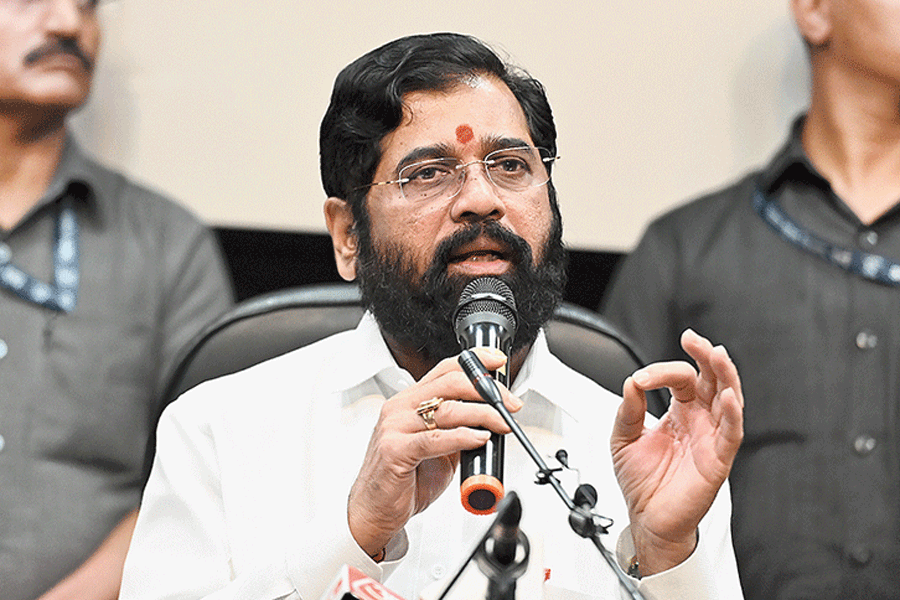Whether Maharashtra will turn into a police state or not will depend on whether the BJP-led Mahayuti returns to power after the state Assembly polls scheduled for later this year.
The incumbent government led by chief minister Eknath Shinde tabled a bill last Thursday, a day before the Assembly’s monsoon session was prorogued. The Maharashtra Special Public Security BIll, if cleared by the Assembly, will grant the police the power to arrest anyone and ban any organisation.
The bill has faced vehement protests from the Opposition.
The bill prohibits any person accused via the new law from filing any appeal. It says: “… and without prejudice to the jurisdiction and powers of the Supreme Court and the High Court under the Constitution of India, no proceeding taken under this Act by the government or the District Magistrate or the Commissioner of Police, or any officer authorised in this behalf by the government or the district magistrate or the commissioner of police, shall be called in question in any court in any suit or any proceeding or application or by way of appeal or revision and no injunction shall be granted by any court or other authority in respect of any action taken or to be taken in pursuance of any power conferred by or under this Act.”
The Maharashtra government has argued that the existing laws are “ineffective and inadequate to tackle this menace of naxalism”.
Former Maharashtra chief minister and current MLA from Karad South, Prithviraj Chavan, contested the state’s claims.
“Provisions under the UAPA and the Bharatiya Nyay Sanhita are adequate to deal with the Naxal problem. There is no need for a new law,” Chavan told The Telegraph Online. “By the looks of it, this is a draconian law and the Congress cannot support it. It is good that the state government did not try to ramrod the bill and pass it on the last day [of the Assembly].”
Chavan said the Congress leaders in Maharashtra will speak with civil rights organisations on the issue. Some civil rights groups are organising seminars in Mumbai and Pune next week on the bill; state Congress leaders are also likely to participate.
Anil Parab, member of the Maharashtra Legislative Council from the Uddhav Thackeray-led Shiv Sena (UBT), said the bill was only tabled and not discussed.
“The fate of the bill will be decided by the new government. We have opposed the bill inside the Assembly and we will go to the people opposing it,” Parab told The Telegraph Online. “They can plant evidence on any of our Sainiks and frame them as Naxals. Andar daalne ka kaam asaan ho jaayega [Putting anyone behind bars will become easier].”
The next session of the Assembly will not happen before elections are held, scheduled later this year.
The draft bill defines “organisation” as any “body or group of persons whether known by any distinctive name or not… whether governed by any written constitution or not”.
Similarly, according to the bill, “unlawful activity” is any action “that constitutes a danger or menace to public order, peace and tranquillity, interferes or tends to interfere with maintenance of public order, interferes with or tends to interfere with administration of law or its established institutions and personnel…. Of indulging in or propagating, acts of violence, vandalism, or others acts generating fear and apprehension in the public… or encouraging or preaching disobedience to established law.”
The district magistrates and police commissioners, is the bill becomes an Act, will have the power to evict any person from any notified premise as well as “take possession of movable property including moneys, securities or other assets found therein…”
Rights activist Teesta Setalvad told The Telegraph Online that the law has “all the archetypical hallmark of a police state”.
“There was no need for this law. Maharashtra already has the Maharashtra Control of Organised Crime Act (MCOCA). Then there are the draconian UAPA and BNS, where some of the provisions are problematic. This law tries to take away even the little safeguards that are there in the UAPA,” said Setalvad.
“A lawyer, writer, a politician who is invited as a speaker by any organisation, who have nothing to do with any such organisation otherwise, can be booked. This law is a complete choking up of the divisions between the judiciary and the executive, for the executive to exercise complete control.”
Maharashtra deputy chief minister Devendra Fadnavis, who holds the home portfolio, tabled the bill.
In the statement of objects and reasons, the bill states: “The menace of Naxalism is not only limited to the remote areas of the Naxal affected states but its presence is increasing in urban areas also through the naxal frontal organisations. The spread of active frontal organisations of the naxal groups gives constant and effective support in terms of logistics and safe refuge to their armed cadres. The seized literature of naxals shows “safe houses” and “urban dens” of the Maoist network in the cities of the state of Maharashtra.”
The coinage “Urban Naxals” gained currency from 2018 onwards and has been used against critics of the Narendra Modi government. Modi himself has often used the words to attack his political opponents the Congress and the Aam Aadmi Party, inside the Parliament and also outside.
“Who holds the contract of Congress? Congress’s contract is with some urban naxals now. Urban Naxals are the ones running the show in Congress,” Modi had said in a rally in Bhopal in September 2023.
In February 2022, on the floor of Parliament, Modi had accused the Congress of being trapped by “Urban Naxals” that had turned it “destructive”.










